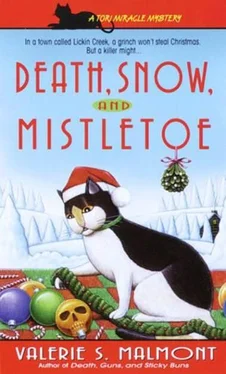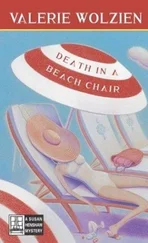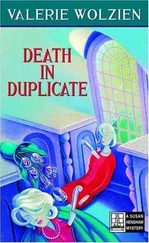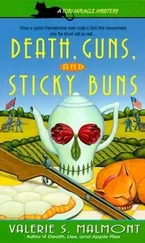For the first time in a long time, I thought of my mother as she'd once been: tall, blonde, and elegant, handling the rigors of foreign service life and my father's infidelities with the stiff upper lip that was expected from women of her generation and social class. Now she hovered in a gray zone, her brain pickled from years of alcohol abuse, in a warehouse called the Willows, where she would stay until she was reclassified as a welfare patient, or whatever it is they call impoverished divorced women.
Praxythea handed me a tissue.
“He's had plenty of Bambi-bimbos over the years,” I sniffed into the Kleenex. “Why did he marry this one?” That he might actually be in love didn't occur to me.
“This might explain it,” Praxythea read aloud, “‘… baby's due near Christmas. I hope you'll find it in your heart to accept Tyfani and your new brother or sister.’”
I laughed, then, at the absurdity. Ambassador Grant-ham Livingston Miracle, age sixty-two, new bridegroom and father-to-be. The old goat's philandering ways had finally caught up with him!
My laughter stopped suddenly. I was going to be a sister to someone, once again. I was going to have a second chance-and this time I was going to get it right. It was a powerful and sobering thought.
My reverie was interrupted by a combination of strange sounds-hissing, scratching, and screeching-coming from the enclosed back porch that served as a laundry/mudroom. I immediately feared one or both of the cats had gotten into trouble, and leaping to my feet, I cried, “Fred… Noel?”
They meowed fretfully from under the table. “Okay, you scaredy-cats,” I muttered. “Let's see what's out there.” I grabbed a carving knife. “Maybe it's our ghost,” I joked, trying to settle my frazzled nerves.
“No, it isn't,” Praxythea said seriously.
I should know better than to joke about ghosts with a psychic.
“Stand back,” I ordered and opened the door about an inch. Through the little crack, I saw a large and very angry animal trying to burrow through the back door.
“What is it?” Praxythea asked.
I slammed the door shut. “Damned if I know. Looks like a giant rat.” The “rat” threw itself against the door. “Good grief,” I gasped. “What should I do?” My back was braced against the door, just in case the creature tried to force its way into the kitchen.
We stared at each other; two city females confronted with a country problem, and with no idea how to resolve it. Then the front doorbell rang.
Praxythea went to answer it, while I stayed at the barricades. When she returned, she was followed by Oretta Clopper.
It didn't take long for our deus ex machina, moving at a surprising speed considering her bulk, to shoo the frightened animal away from the back door and replace the dryer exhaust hose.
“Just a little possum, looking for a warm hidey-hole,” she said with a sniff. “More afraid of you than you were of it.”
I doubted that.
It suddenly occurred to me to ask Oretta Clopper, who had never before visited me, why she had dropped by on this particular morning. I hoped she wasn't bringing me a copy of the play she'd told me about.
“I'll show you,” she said. “It's in the living room.” As I followed her out of the kitchen, Praxythea made a strange sound, which I would have interpreted as a giggle if she were the giggly type.
“What the heck is it, Oretta?” I asked softly, so as not to disturb the large, prehistoric-looking creature lying in a huge, rectangular glass box.
“It's an iguana. A man brought it to the Humane Society this morning. It belonged to his kids, but it grew bigger than they expected. They don't have room for it anymore.” Her frown told me exactly what she thought of people who didn't accept proper responsibility for their pets.
“I need someone to care for it until I can find it a suitable permanent home.” She smiled brightly. “Naturally, I thought of you, since I know you're an animal lover.”
“Cats,” I muttered. “It's cats I love. Fuzzy, warm animals you can snuggle up to.”
Praxythea peeked at it over my left shoulder. “Does it have a name?”
“No names,” I pleaded. Once you name an animal, it assumes a personality and becomes a member of the household.
“It's called Icky,” Oretta announced.
I groaned.
“How cute,” Praxythea murmured.
Oretta launched into a long, involved description of what it ate, and I relaxed a little upon learning it was a vegetarian. As long as it wasn't interested in eating cats or people, I figured I could live with it for a while. We moved it into the kitchen because that was the warmest room in the house and plugged in its heat lamp.
“It should only be for a few days,” Oretta promised. “Be sure and wash your hands after you touch it-they can carry salmonella.”
Salmonella-just what I needed in my kitchen!
Oretta accepted my offer of coffee, and we sat down at the kitchen table. When I questioned her about last night's fainting spell, she said she was feeling just fine.
“Doctor said I must have been overexhausted to faint like that. It's all the work I've put in on the pageant and, of course, supervising the food tables for the search parties up in the mountains. The strain was just more than I could bear.” She sighed deeply, worn out from her martyrdom. “But I'm not one to back down when a job needs done.”
“It was quite a night,” I said. “To start out hunting for one lost child and find another. Do you have any idea who it might have been in the quarry?”
Oretta's eyes widened with surprise as she said, “Why of course, it's Eddie Douglas. Everybody there knew that.”
'Tis the season to be jolly

“OH, SURE, EVERYBODY KNEW THAT!” I MUTtered to myself as I pulled out of the driveway, spraying gravel in my wake. “Everybody but me. You'd think someone might have mentioned it to me-for the newspaper.” I sighed as I wondered if I was ever going to be accepted here in Garnet's hometown, or would I always be an “outsider”?
At the end of the lane, I spied Ginnie Welburn sweeping a light dusting of snow off a porch. So that was where she lived. In typical New York fashion I'd been oblivious to everyone who lived around me. She saw me, raised one arm, and stepped forward as if she wanted me to stop and chat. However, I was already late for the borough council meeting, so I merely waved and continued on my way.
Outside Lickin Creek's historic borough hall, delicate snowflakes dropped lightly onto the redbrick sidewalk. Caught by sudden gusts of icy air, they swirled like confetti around the picturesque gaslights, settled like talcum powder on the shoulders of the little mermaid bathing in the empty fountain on the square, and persistently struggled to enter the charming, but very old, municipal building through the cracks around the doors and windows.
Shortly before Thanksgiving, the borough council, acutely in tune with the concerns of its constituents and aware of upcoming elections, had voted to set the central heating system at an energy-saving sixty-two degrees. Despite the sheets of heavy plastic nailed over the inside of the ten-foot-tall windows, this afternoon the council's meeting room was only slightly warmer than a meat locker. Notice I said slightly warmer.
A wood-burning stove, dating back to the late eighteen hundreds, was lit to raise the frigid temperature, but all it accomplished was to fry those who sat directly in front of it, while the people seated at the far end of the long table had to keep on their coats, hats, and gloves.
Читать дальше













